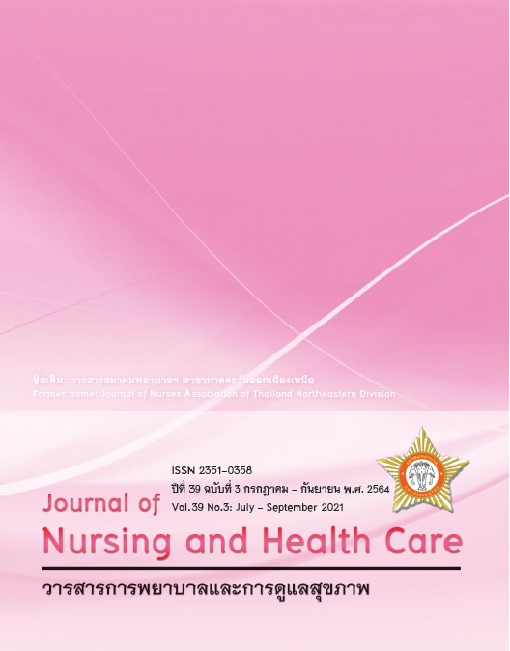การพัฒนาแนวปฏิบัติการพยาบาลในการป้องกันภาวะแทรกซ้อน ในผู้ป่วยที่มีภาวะถอนพิษสุราหอผู้ป่วยใน โรงพยาบาลร้อยเอ็ด
คำสำคัญ:
การพัฒนาแนวปฏิบัติการพยาบาล, การป้องกันภาวะแทรกซ้อนในผู้ป่วยที่มีภาวะถอนพิษสุรา, ผู้ป่วยติดสุราบทคัดย่อ
การพัฒนาแนวปฏิบัติการพยาบาลทางคลินิกในการป้องกันภาวะแทรกซ้อนในผู้ป่วยที่มีภาวะถอนพิษสุรา ใช้รูปแบบการปฏิบัติตามหลักฐานเชิงประจักษ์ของ Soukup ประกอบด้วย 4 ระยะ คือ 1) การค้นหาประเด็นปัญหาทางคลินิก 2) การสืบค้นหลักฐานเชิงประจักษ์ 3) การนำแนวปฏิบัติไปทดลองใช้ และ 4) การนำแนวปฏิบัติที่ปรับปรุงแล้วไปใช้จริงหน่วยงานการศึกษา แนวปฏิบัติการพยาบาลนี้พัฒนาจากงานวิจัย จำนวน 22 เรื่อง ที่ผ่านการประเมินคุณภาพ แล้วนำมาสังเคราะห์สร้างเป็นแนวปฏิบัติการพยาบาลขึ้น ดำเนินการตรวจสอบคุณภาพโดยผู้ทรงคุณวุฒิ 5 ท่าน และผ่านเกณฑ์การประเมินคุณภาพแนวปฏิบัติ AGREE II
ผลการศึกษา: แนวปฏิบัติการพยาบาลเพื่อป้องกันภาวะแทรกซ้อนในผู้ป่วยที่มีภาวะถอนพิษสุรา ที่เข้ารับการรักษาในหอผู้ป่วยใน โรงพยาบาลร้อยเอ็ด ประกอบด้วย 4 ส่วนได้แก่ 1) การสร้างสัมพันธภาพและปฐมนิเทศผู้รับบริการ การคัดกรอง การประเมินสภาพแรกรับ คัดแยกจำแนกประเภทผู้ป่วย ระดับความรุนแรงของภาวะถอนพิษสุรา 2) การลงบันทึกผลการประเมิน คัดกรอง การรายงานแพทย์ตามหลัก SBAR 3) การจัดการโดยใช้กระบวนการพยาบาลในการดูแลตามความเร่งด่วน และ 4) การวางแผนจำหน่าย และการประสานดูแลต่อเนื่อง
ข้อเสนอแนะ: การศึกษาครั้งต่อไปควรมีการศึกษาประสิทธิผลของแนวปฏิบัติการพยาบาลในการป้องกันภาวะแทรกซ้อนในผู้ป่วยที่มีภาวะถอนพิษสุรา เพื่อทดสอบผลลัพธ์ทางการพยาบาล และนำผลมาใช้ปรับปรุงคุณภาพของแนวปฏิบัติการพยาบาล
Downloads
เอกสารอ้างอิง
1. GBD 2016 Alcohol collaborators. (2018). Alcohol use and burden for 195 countries and territories, 1990–2016: a systematic analysis for the Global Burden of Disease Study 2016: The Lancet, Volume 392, Issue 10152,22-28 September 2018, Page1015-1035.
2. Hoffman., R S. & Weinhouse.,G. (2019). Management of moderate and severe
alcohol withdraw Syndromes. Retrieved June 27, 2011, from http://www.uptodate. Com/contents/mangrment-of-moderate-and-severe-alcohol-withdrawal-syndromes.
3. Yutawisuttham, S., Boontham, A., Sangsangtham, M., Anan, K., Buaeng, T., & Chaplap, S. Adaptation of drinking behavior in the community. Journal of Phrapokklao College of Nursing Chanthaburi [online journal] 2016; 27 (2): 160-168.
4. National Statistical Office. Population Smoking and Alcohol Behavior Survey, Population and Social Statistics Group, Bureau of Economic and Social Statistics, Bangkok. 2014.
5. Amaraporn, Fangkaew, A., & Dangdomyut, P. Predictive factors of alcohol withdrawal in alcohol addicts [Abstract]. Psychiatric and Mental Health Nursing, 2017; 31 (2) .95-106.
6. Roi Et Hospital Statistics. Report of the patient in internal medicine alcohol detoxification 2017-2019. Roi-Et: Roi-Et Hospital. 2019.
7. Boromarajonani National Institute of Drug Addiction Treatment and Rehabilitation, Department of Medical Affairs. Pathumthani: Chulalongkorn University Press. (2015).
8. Mayo-Smith MF, Beecher LH.Fischer TL. et al. Management of Alcohol Withwthdrawal delirium. An evidence-based practice guideline. Arch Intern Med 2004;164;1405.
9. Phillip S., Haycock C , & Boyle, D. (2006). Development of an Alcohol Withdrawal Protocol. Clinical Nurse specialist. 20(2): 190-198.
10. Klinpiboon, A., Srisorn, P., & Fangkaew, A. (2013). Results of improvement and development of the alcohol withdrawal assessment. Phrasrimahapho Hospital. Journal of Science and Technology Ubon Ratchathani University 15(3);30-42.
11. Gortney J S. et al. (2016). Alcohol withdrawal syndrome in medical patients. Cleveland Clinic Journal of Medicine. January; 83(1): 67-79.
12. Kattiman S & Bharadwaj B. (2013). Clinical management of alcohol withdrawal:
systematic Review .Industrial Psychiatry. Jul-Dec.22(2): 100-108.
13. Soukup, S. M. (2000). The center for advanced nursing practice evidence-based
practice model. Nursing Clinics of North America,35(2),301-30.
14. Lalit-Anantphong, D. (2010). Alcohol withdrawal: syndrome and treatment. Chula
Med J 54 (1);68-79.
15. Berl K.,Collins, M l., Melson,.Jo.,Mooney R,. Muffley., Wright-Glover.,A. (2015).
Improving nursing knowledge of alcohol withdrawal . Journal for Nurses in Professional Development, 31(6), 320-332.
16. Nuansang, J. Ethical Principles for Research Involving Humans (Human Subject Protection). (2560). Journal of Politics, Administration, and Law, 10(2);132-155.



